Unemployed 24-Year-Old Whines to His Mom After His Aunt Asked Him to Deliver on Pet Sitting She Paid Him to Do
Expectations change as we grow up. Children are praised for learning basic skills, and exploring their hobbies and interests is essential for teenagers, while adults are expected to accomplish grown-up tasks.
We reach these milestones at different paces, but the older we get, the less tolerance there is for childish behaviors. It was during Christmas that a Redditor's 24-year-old nephew learned this lesson.
OP's nephew, whom we will call John, moved back in with his mom after college. They live about a mile away from OP's house.
John has been unemployed since quitting his job at a chain restaurant. For the past year, he has been the on-call pet sitter for OP's dogs.
They pay him his rate, and they haven't had any issues so far. OP and her family will be away for Christmas for six days.
They have to leave their two dogs at home, so she pays John in advance to ensure that the dogs eat and go out every few hours. It's understood that John won't be able to come around on Christmas Eve, but he did promise to check on the dogs early the following day.
However, John didn't deliver on his promise, and OP saw it all on her security cameras. She texted John to let him know if he couldn't come over so she could ask their friends to check on the dogs.
Without replying to her, John called his mom to complain about OP's message to him

OP's sister, John's mom, argued with OP about being mean to John when he's trying to do his best
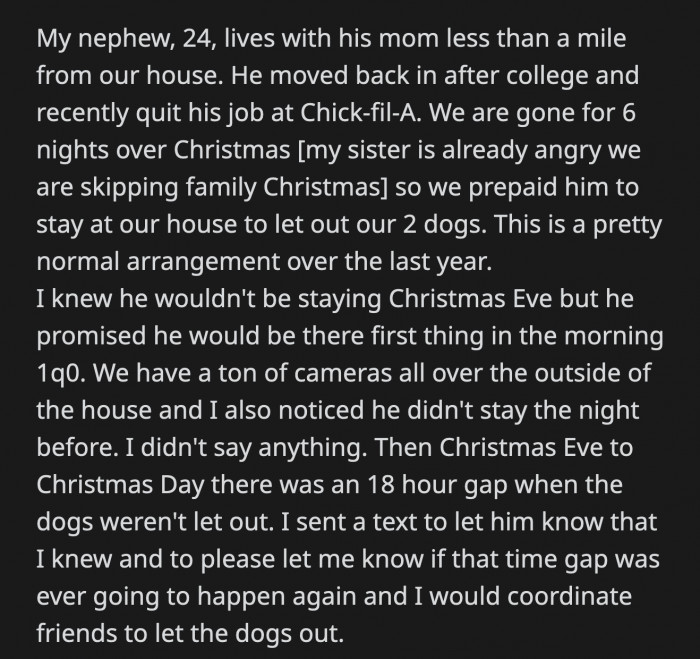
OP said she just wanted John to coordinate with her when he can't be with the dogs so she can make alternative arrangements
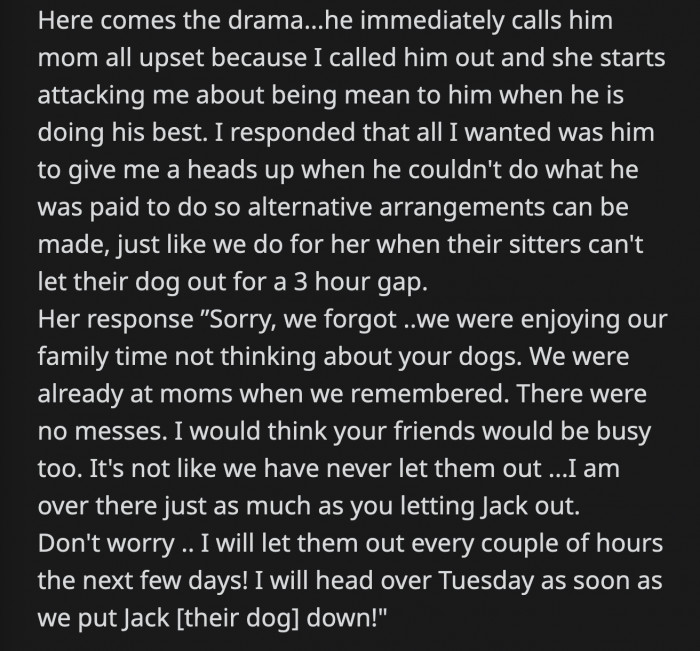
The Psychology of Responsibility and Accountability
The situation involving the unemployed individual raises important questions about responsibility and accountability in caregiving roles. According to Dr. Terri Orbuch, a relationship researcher, "Feelings of obligation in caregiving often arise from societal expectations, which can create pressure that complicates one's ability to meet those responsibilities." It's vital to consider how these expectations may impact an individual's ability to fulfill their duties, especially when external pressures are at play.
John didn't pet sit for the entire six days because it snowed, and he was scared to stay alone at OP's house. OP will no longer hire him in the future and will opt for another service.
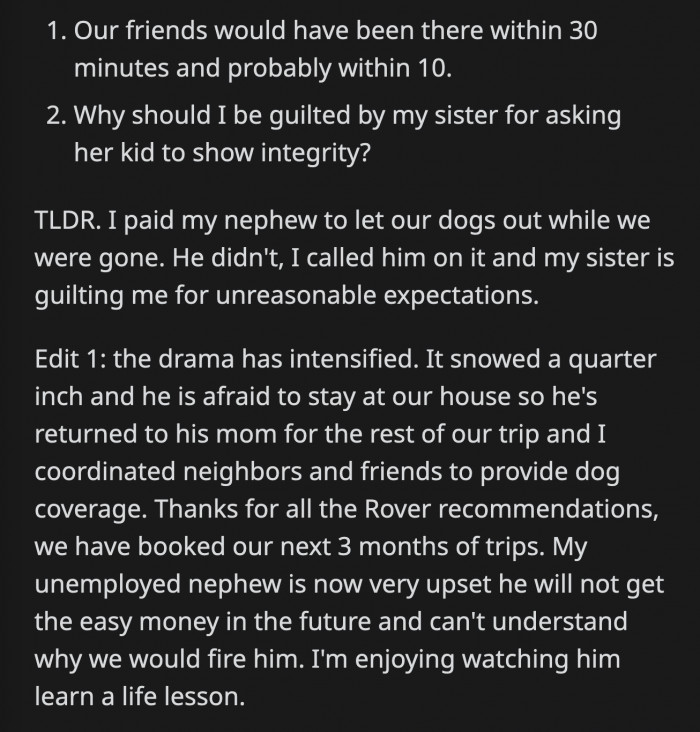
Her dogs' quality of life is on the line here, and OP is not getting her money's worth with her unreliable nephew
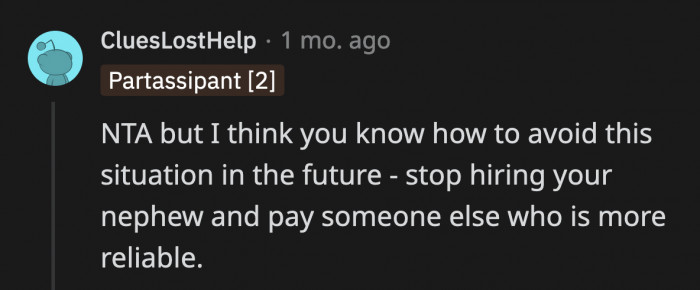
OP said it's not that easy to make arrangements for her large dog because he isn't keen on strangers, but she will talk to the vet to see if they know any experienced sitters

From a psychological perspective, the individual's reaction to being called out for poor pet-sitting is indicative of a defense mechanism. According to research in behavioral psychology, individuals may experience feelings of shame or guilt when confronted with their failures, leading to defensive or dismissive responses. This reaction can be exacerbated by external pressures such as family expectations and societal norms.
OP received several recommendations from fellow dog owners who found their pet sitters through reputable fosters

They can also try checking their dogs into one of those overnight dog hotels or boarding places
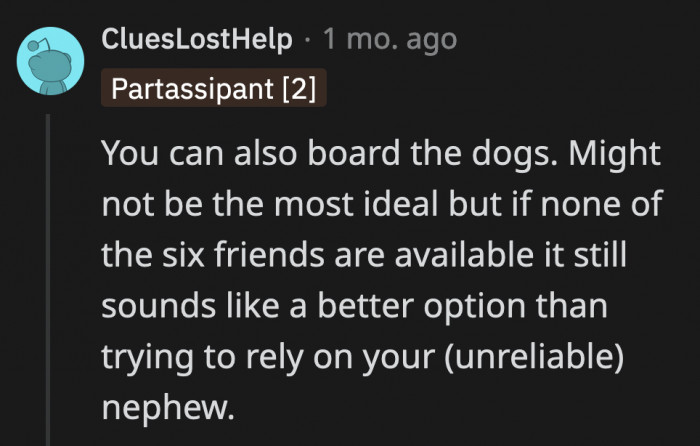
Rover is OP's best bet for finding competent, skilled, and experienced dog sitters as long as she is upfront about any issues her dogs have

Understanding Motivation Behind Caregiving
Motivational theories suggest that a lack of intrinsic motivation can significantly affect an individual's ability to fulfill caregiving roles. Studies show that when individuals feel coerced into responsibilities, their commitment may wane, leading to inadequate care. Understanding these motivational factors can help identify barriers to effective caregiving and promote accountability.
OP did nothing wrong; John is a grown-up who agreed to this job. He was paid to do it, and he failed. OP didn't even scold him; she just asked him to let her know if he couldn't show up.
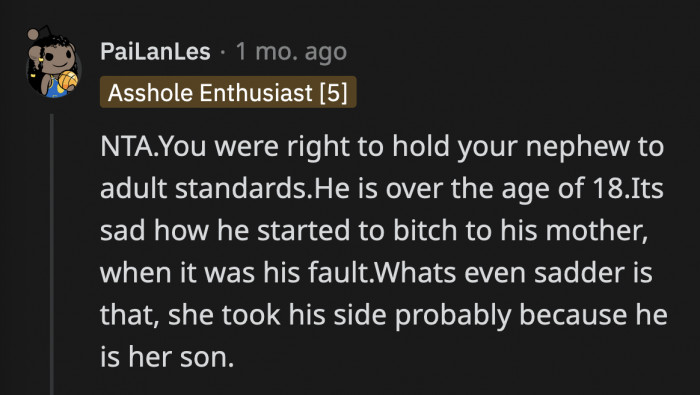
John's mom is definitely enabling his incompetence and immaturity
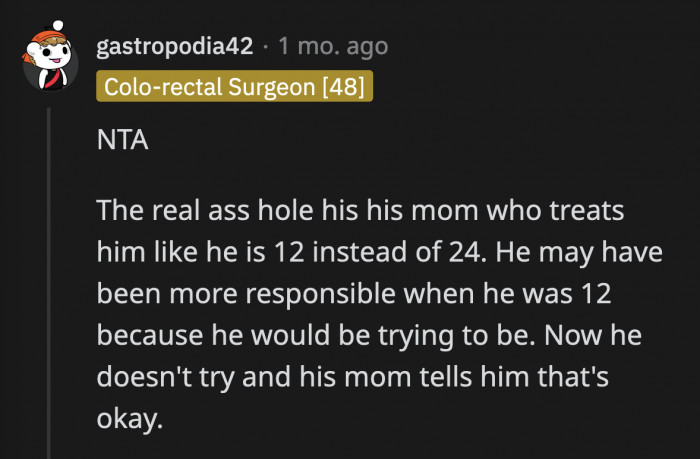
She didn't even let him correct his mistake; she just swooped in and 'saved' him from his mean aunt
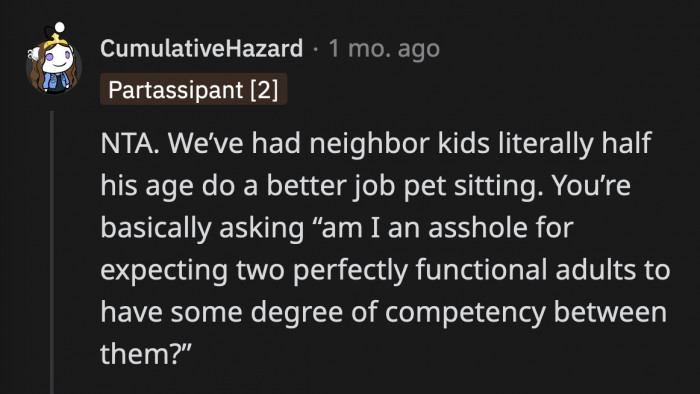
Addressing feelings of inadequacy and responsibility can be challenging, particularly for those struggling with unemployment. Research indicates that mental health issues such as depression can impair motivation and responsibility, creating a cycle of neglect. It's essential to recognize these barriers and seek support to break free from this pattern.
The dogs were left alone for 18 hours without potty breaks; they must have been extremely uncomfortable
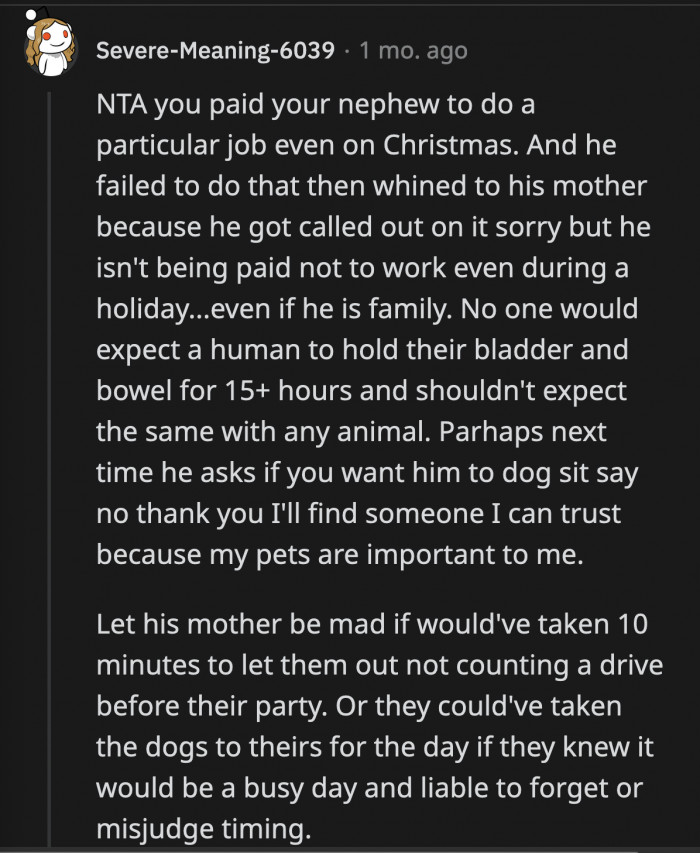
It's not like OP asked him to consolidate a day-to-day report; she just wanted to know if she needed to make alternative arrangements for her dog, and John got upset by that?
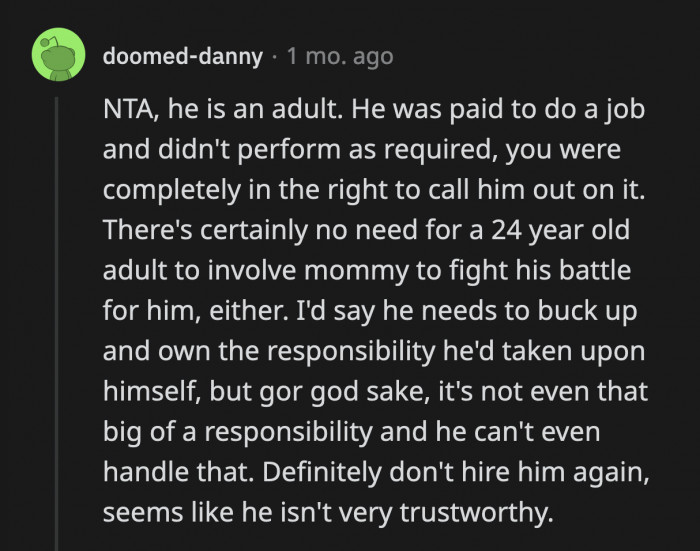
He definitely knew he had dropped the ball, and instead of facing the consequences, he cried to his mom about his mean aunt. Venting to your parents about your terrible boss is cathartic, but this isn't the case here at all.
He is a 24-year-old man who can handle the pressures of pet-sitting his aunt's two elderly dogs for less than a week. OP and her dogs are better off when they find a more competent sitter.
Practical Solutions for Accountability in Caregiving
To enhance accountability in caregiving roles, individuals can benefit from establishing clear expectations and boundaries. Setting achievable goals and seeking support from peers can promote a sense of responsibility. Additionally, engaging in self-reflection to identify personal motivations and barriers can help individuals recommit to their caregiving roles.
Psychological Analysis
This situation illustrates the challenges of accountability in caregiving roles, especially when external pressures and personal struggles are involved. It's important to recognize that motivation plays a key role in fulfilling responsibilities. Encouraging self-reflection and establishing clear expectations can help individuals navigate these challenges more effectively.
Analysis generated by AI
Analysis & Alternative Approaches
In conclusion, the psychological aspects of responsibility and accountability in caregiving roles are complex and multifaceted. Understanding the motivations behind individuals' actions can foster empathy and lead to more effective interventions. By promoting intrinsic motivation and establishing clear expectations, we can enhance accountability in caregiving situations.



